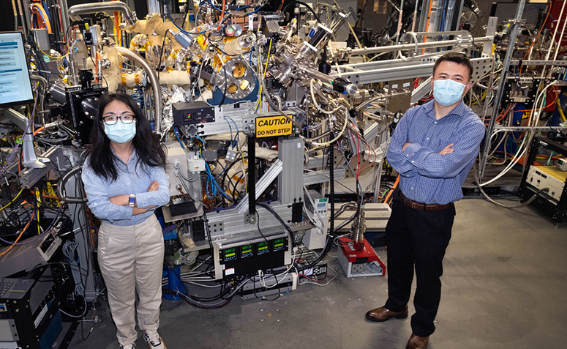Your location:Home >Automotive News >
Time:2022-06-07 11:27:17Source:
A team of researchers led by chemists at the U.S. Department of Energy's (DOE) Brookhaven National Laboratory have shown that the use of moderate amounts of difluorophosphoric acid in common commercial electrolytes Lithium (LiPO2F2), can realize a nickel-rich layered cathode material with an ultra-high termination voltage of 4.8 V.The related paper was published in the journal "Nature Energy".

Image credit: Brookhaven National Laboratory
These findings may provide a remedy for the degradation of nickel-rich cathode materials, especially under high voltage conditions.The research is part of the DOE-sponsored Battery500 consortium, which is led by DOE's Pacific Northwest National Laboratory (PNNL) and is working to significantly improvethe energy density of lithium-ion batteries forelectric vehicles .
Sha Tan, a Stony Brook University doctoral student and co-first author on the research paper, worked with the electrochemical energy storage group at Brookhaven Lab, initially to investigate how the additive lithium difluorophosphate could be used to improve battery performance. low temperature performance.Out of curiosity, she tried high-pressure cycling at room temperature with the additive.
It was found that if the voltage was increased to 4.8 V, this additive indeed protected the cathode well and enabled the battery to achieve excellent cycling performance.
When paired with a lithium metal anode, nickel-rich layered cathode materials promise high energy density for next-generation batteries.But these materials are prone to capacity loss.One of the main problems is particle breakage during high-voltage charge-discharge cycles.High voltage operation is important because the total energy stored in the battery increases with the useful operating voltage.
Another problem is the dissolution of transition metals from the cathode and subsequent deposition on the anode.The phenomenon is known in battery circles as "crosstalk," said Brookfield culturologist Enyuan Hu, who led the study.During high-voltage charging, small amounts of transition metals in the cathode lattice dissolve, then pass through the electrolyte and deposit on the anode side.When this happens, both the cathode and anode degrade.The result is poor battery capacity retention.
The researchers found that adding a small amount of additives to the electrolyte suppressed crosstalk.As the additive decomposes, it produces lithium phosphate (Li3PO4) and lithium fluoride (LiF), which form a highly protective cathode-electrolyte interface, a thin solid layer that forms on the battery cathode during cycling.
Enyuan Hu said: "By forming a very stable interface on the cathode, this protective layer significantly suppresses the loss of transition metals on the cathode surface. The reduced loss of transition metals helps to reduce the deposition of these transition metals on the anode. In this sense, Said that the anode is also protected to some extent. We believe that inhibiting transition metal dissolution is one of the key factors in significantly improving cycling performance."
The researchers found that the electrolyte additive enabled the nickel-rich layered cathode to be cycled at high voltages to increase energy density and still retain 97% of its initial capacity after 200 cycles.
Recent studies suggest that single-crystal-based cathodes may outperform polycrystalline cathodes in suppressing particle crack formation.However, this study shows that cracking in polycrystalline materials can also be effectively addressed using additive engineering.
Going forward, the researchers hope to test the additive under more challenging conditions to explore whether the cathode material can withstand more cycles for use in actual batteries.
Statement: the article only represents the views of the original author and does not represent the position of this website; If there is infringement or violation, you can directly feed back to this website, and we will modify or delete it.
Preferredproduct
Picture and textrecommendation



2022-06-09 11:32:20



2022-06-09 11:30:16
Hot spotsranking
Wonderfularticles

2022-06-09 11:29:41

2022-06-09 11:25:08



2022-06-09 11:22:08

Popularrecommendations
